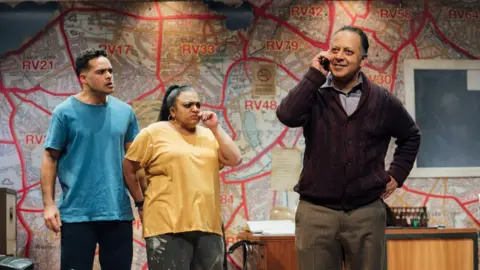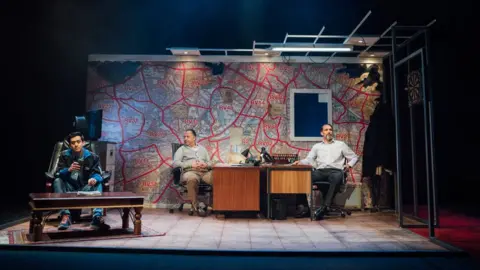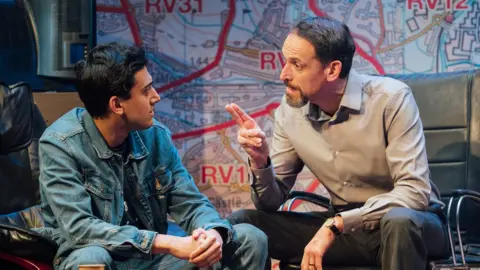Ishy Din: Driving a taxi made me a better playwright
 Helen Murray
Helen MurrayThe two jobs may not have much in common, but driving a taxi was the perfect training to become a playwright, according to Ishy Din.
"The beauty of cabbing is that you don't know who the next person to get in your car is going to be," he says.
"One minute you could be talking to a judge, and then the next person is a housewife, and the next person is a drug addict, and the next person is a nurse…"
"I was conscious that I was getting the opportunity to speak to a whole spectrum of society."
Din got a glimpse into the lives of a huge array of characters and kept a notebook in his cab to jot down lines that customers told him. He also kept a laptop under his seat to write his debut play between drop-offs and pick-ups.
That play was Snookered, about four young British Muslim friends who reunite in a snooker hall, which won acclaim and awards when it was staged in 2012.
 Mark Douet
Mark DouetNow, he's gone back to his taxi days for inspiration for Approaching Empty, a power struggle between two older friends, Raf and Mansha, set in a minicab office in Din's home town of Middlesbrough.
"The universality of the story is that it's about friendship, it's about families, it's about community, it's about betrayal," the writer says.
"I've set it in this small cab firm because that was a world that I knew, and I liked the idea of the claustrophobia of these little cab offices.
"It happens to be Raf and Mansha, but it could quite easily be Harry and Jack in a backstreet garage, or June and Margaret in a greasy spoon. It's very much about working class communities and the themes could be applied to many different communities and peoples."
Raf and Mansha moved from Pakistan in their youths and worked in British factories - until the factories shut.
 Helen Murray
Helen MurrayThe action in the play takes place between the death and the funeral of Margaret Thatcher in 2013, and the former prime minister's impact on British industry in the 1980s is one of the themes.
Raf is the ruthless boss who admires the fact "she knew there was no choice but to change". Mansha, on the other hand, was "happy with the way things were".
Din says: "Margaret Thatcher was a seminal figure for a generation of Asian communities because our raison d'etre was the factories. That's why we came. And she closed them down.
"People sort of fell into two categories - the entrepreneurs who used their redundancies to open businesses, and some became incredibly successful and have to thank Thatcher for a lot of their success because she created that opportunity.
"But some were quite steady Eddies, who thought, 'I'll pay my mortgage off and then I'll work as a cab driver or I'll work in a takeaway, but I know I'm secure with my future.'
"That really interested me, so I thought, let's make these two friends. Let's have one of each."
 Helen Murray
Helen MurrayThe writer himself left school in 1985 at a time when the path into industrial apprenticeships was drying up along with the industries. On Teesside, it was mainly steel, which once employed around 33,000 people. But the last blast furnace shut in 2015.
That history is bubbling in the background of the play as Raf and Mansha reminisce about the past and plan for the future.
"Communities were destroyed and people have been left rootless, hankering after something that's disappeared - a security, a certainty in the future," Din says.
"It [the economic situation] dictates that if you pull yourself up by your bootstraps, this will be fantastic for you. But not everybody can, and not everybody has the tools or the opportunities to do that, and not everybody has the security of a job and a pension, and those sorts of things have gone.
"Being from that world, it hasn't really worked out as the theory suggested that it would. We see huge divides and we see huge amounts of anger and resentment in communities that feel that they have been left by the wayside, and that gap between the haves and have nots has grown so wide now.
"The ones that have won, won big, but the ones who have lost out are really angry and feel let down."
 Helen Murray
Helen MurrayThe title Approaching Empty is taken from taxi jargon, but also refers to the decline of the former industrial towns as well as Raf and Mansha's careers.
The play has just opened at the Kiln theatre in Kilburn, north-west London, in a co-production with theatre company Tamasha and Live Theatre in Newcastle, where it will run in February before a UK tour.
The theatre world is trying hard to attract more diverse audiences by telling stories about, and aimed at, a wider range of characters and communities. That's not just about ethnicity, though, Din says.
"We really need to make theatre more accessible for what we traditionally felt were working class people, because it's theirs as much as anybody else's," he explains.
"It was a people's medium, wasn't it? And it's somehow been co-opted into this quite exclusive group and [other] people think, 'Theatre? That's not really for us'. But actually it is."
People who make theatre should get out and perform among those communities, and venues need to become more welcoming, he believes.
"It's a case of demystifying them, opening them up, making them community hubs, so people can come in and think, 'Yeah, this is a part of my community'. Libraries have been closed down… just somewhere for people to have a cup of tea, read a book, whatever it is.
"We can start chipping away at this idea that 'There's this mysterious building in our town - God knows what happens in it'.
"And then tell them stories that are universal."

Follow us on Facebook, on Twitter @BBCNewsEnts, or on Instagram at bbcnewsents. If you have a story suggestion email [email protected].
